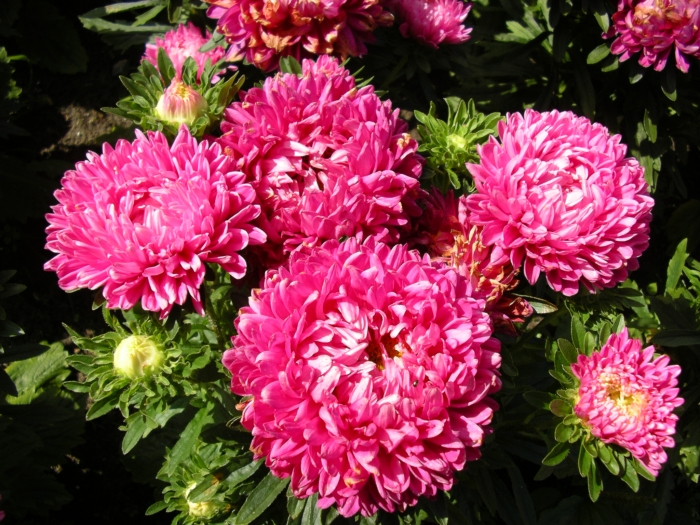China Aster
(Callistephus chinensis)
China Aster (Callistephus chinensis)
/
/

darius_saulenas
CC BY 2.0
Image By:
darius_saulenas
Recorded By:
Copyright:
CC BY 2.0
Copyright Notice:
Photo by: darius_saulenas | License Type: CC BY 2.0 | License URL: https://creativecommons.org/licenses/by/2.0 | Uploader: File Upload Bot (Magnus Manske) | Publisher: Wikimedia Commons | Title: Acacia_purple_(7774266528).jpg | Notes: {{Information |Description={{en|1=''Calostemma purpureum'' Botanical Garden of the University of Basel.}} |Source={{own}} |Author=[[User:Jdsteakley|James Steakley]] |Date=2010-09-05 |Permission= |other_versions= }} [[Category:Botanischer Ga

















































































Estimated Native Range
Summary
Callistephus chinensis, commonly known as China Aster, is an annual herb originally found in meadows, along stream banks, and in lightly shaded areas across China, the Russian Far East, and Xinjiang. It typically grows 20–100 cm (7.9–39.4 in) tall with an erect, mostly unbranched stem. The plant is notable for its large, solitary flower head that appears at the stem’s top and occasionally on branches. The flower head consists of one or two rings of ray florets, which are most often found in shades of reddish-purple, although the inner layer may have a purple tinge. The flowering period extends from August to October in the northern hemisphere, and the flowers are known for their showiness.
China Aster is valued for its vibrant, colorful blooms and is widely used in gardens for border plantings, cut flowers, and container displays. It is particularly appreciated for its ease of maintenance and the variety of available cultivars, which offer a range of flower colors, heights, and forms, including both single and double heads. While it thrives in fresh, nutrient-rich, and humus-rich soils, it is adaptable to a variety of soil conditions as long as they provide adequate drainage. It requires full sun to part shade and moderate watering. Gardeners should be aware of potential issues such as powdery mildew and aster wilt, which can affect the plant’s health. To prevent these diseases, proper spacing for air circulation and avoiding overhead watering are recommended.CC BY-SA 4.0
China Aster is valued for its vibrant, colorful blooms and is widely used in gardens for border plantings, cut flowers, and container displays. It is particularly appreciated for its ease of maintenance and the variety of available cultivars, which offer a range of flower colors, heights, and forms, including both single and double heads. While it thrives in fresh, nutrient-rich, and humus-rich soils, it is adaptable to a variety of soil conditions as long as they provide adequate drainage. It requires full sun to part shade and moderate watering. Gardeners should be aware of potential issues such as powdery mildew and aster wilt, which can affect the plant’s health. To prevent these diseases, proper spacing for air circulation and avoiding overhead watering are recommended.CC BY-SA 4.0
Plant Description
- Plant Type: Herb
- Height: 2-3 feet
- Width: 1-1.5 feet
- Growth Rate: Moderate
- Flower Color: Blue, Yellow, Orange, Pink, Purple, Red, White
- Flowering Season: Summer, Fall
- Leaf Retention:
Growth Requirements
- Sun: Full Sun, Part Shade
- Water: Medium
- Drainage: Medium
Common Uses
Bee Garden, Bird Garden, Border Plant, Low Maintenance, Potted Plant, Showy Flowers
Natural Habitat
Meadows, along stream banks, and in lightly shaded areas
Other Names
Common Names: Annual-Aster, China-Aster, Chinese Aster, Sommeraster, Gartenaster, Madeleine-Aster, Reine Marguerite, Sommaraster, Trädgårdsaster, Cui Ju
Scientific Names: , Callistephus chinensis, Aster regalis, Aster chinensis, Callistephus ×sinensis, Callistephus hortensis, Brachyactis chinensis, Amellus speciosus, Aster hortensis, Aster lacinians
GBIF Accepted Name: Callistephus chinensis (L.) Nees